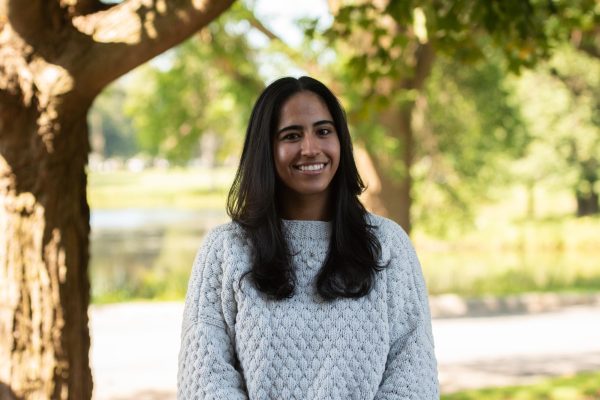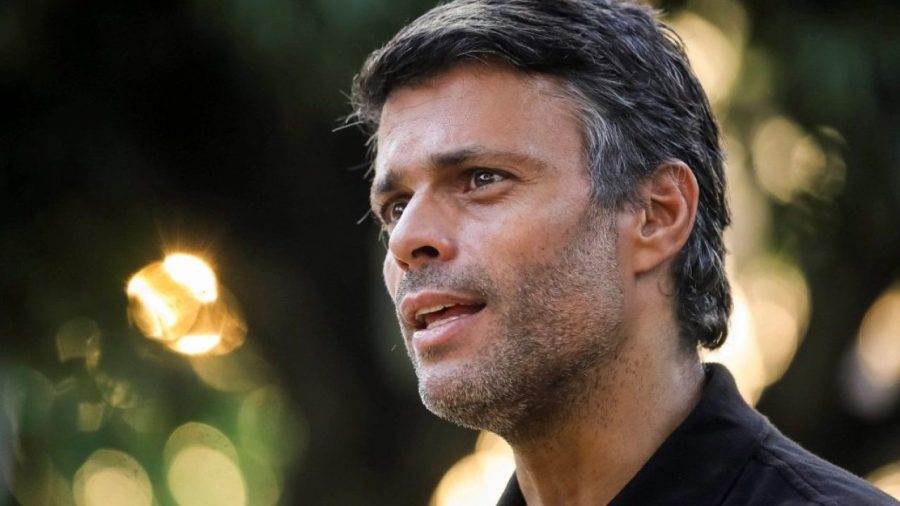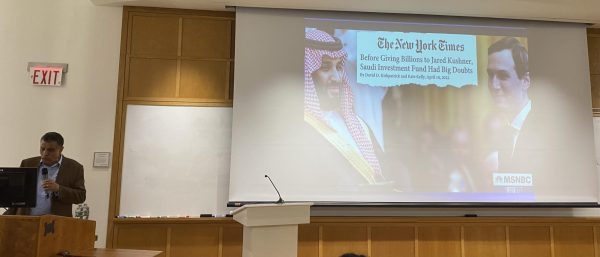Venezuelan Opposition Leader Leopoldo López Joins Colgate for Virtual Lecture and Discussion
Leopoldo López, a Venezuelan political leader and pro-democracy activist, joined Colgate University virtually for a lecture and discussion about his role in opposing the autocratic regime in Venezuela during the 2014 protests in Persson Auditorium on Monday, April 17. Professor Valerie Morkevičius, chair of the political science department, organized the event.
López founded the Venezuelan opposition party, Voluntad Popular, and served as mayor of the Chacao municipality in Caracas, where he was recognized by Amnesty International for his anti-corruption work. In 2014, López was arrested on false charges of violence for leading peaceful nationwide protests against Nicolás Maduro’s autocratic regime. After facing several assassination attempts, López was unjustly sentenced to 14 years in prison, during which he spent 4 years in military prison and solitary confinement. After being placed on house arrest, he was able to escape and sought asylum at the Spanish Embassy in Caracas.
Senior Seth Rock, who helped organize the event, explained why it was important for Mr. López to come to Colgate, especially to provide his insight regarding the 2024 Venezuelan presidential election.
“Given Venezuela’s humanitarian crisis and current authoritarian regime, it’s critical to consider the perspectives and strategies of those seeking to improve the condition of the country through electoral victory and a return to democratic governance,” Rock said.
In 2020, López was able to escape Venezuela and reunite with his family in Spain, where he currently lives in exile. He explained that his story not only represents his own struggles but also the struggles of millions of Venezuelans fighting for freedom.
“Gradually, we saw all rights taken away from us from different sectors. [Maduro’s regime] was after union leaders, the business community, journalists, media, students, housewives, artists and politicians,” López said.
López noted that before Maduro’s regime, Venezuela was a working democracy compared to the rest of Latin America, and was the fourth largest economy in the region. However, after the repressive actions of the regime, the economy has collapsed by 80 percent since the price of oil fell in 2014. López explained how the country has fallen into a complex humanitarian and economic crisis, with millions of Venezuelans in poverty with no access to food, electricity or gasoline.
“Before 2014, there were approximately 500,000 Venezuelans living outside of Venezuela. But now, more than 8 million people are living outside the country, sparking a humanitarian and migration crisis since 25 percent of the population has left the country,” López said.
According to López, these crises have a clear root cause — autocracy and tyranny — that is managing the country under a structure of organized crime with the help of military support, including the cocaine business and crypto mining.
After escaping to Spain, López launched Frontlines of Freedom in November 2022, a non-partisan project that brings together dissidents from oppressive countries who are committed to identifying and combating threats to freedom around the world, reminding democracies of their potential to serve as global democratic inspiration.
López stressed the importance of democracies committing to their values and promoting these ideals to combat autocrats in other states. When speaking about Russia and Iran’s support of Venezuela, López explained how autocratic countries support, defend and learn from each other.
“There is a global dynamic and network of autocrats that are in a non-ideological alliance, and rather a practical alliance in order to defend a model of autocracy against liberal democracy,” López said.
Professor Morkevičius found the idea of democracies supporting each other especially interesting from the lecture, believing that it was important for López to speak with students in order to spread these ideas of democracy and freedom.
“There is an idea that democracies owe a responsibility [to support] democratic movements globally,” Morkevičius said, “and while anti-democratic regimes provide material support for each other, democracies offer thoughts and prayers and less materialistic support. It is really important for students to be exposed to different views and politics all over the world.”
Sophomore Georgette Manos also found the event insightful, noting that she learned new information about Latin America.
“I decided to attend because I think, often, Latin America is a region of the world that is ignored in geopolitics to an extent,” Manos said. “I wanted to learn more about the current political situation in Venezuela.”
López ended his lecture by discussing the impact of the current war in Ukraine, arguing that the aftermath of the war will send a strong global message in the battle between autocracy and democracy. Additionally, he emphasized that the Venezuelan people must mobilize for the upcoming 2024 election by protesting and voting, in addition to gaining support from democratic governments such as the United States and countries in Europe.

Mehek Singh is a senior from Baltimore, MD concentrating in international relations and minoring in global public and environmental health. She has previously...







